
Gornergrat Bahn ticket from Zermatt
Validity: All day

8 Activities
Filter
Better than 4.5 stars
Better than 4 stars
Better than 3.5 stars
Better than 3 stars
No Rating

Validity: All day

Duration: 2 hours
Why book with Swiss Activities?

Validity: All day
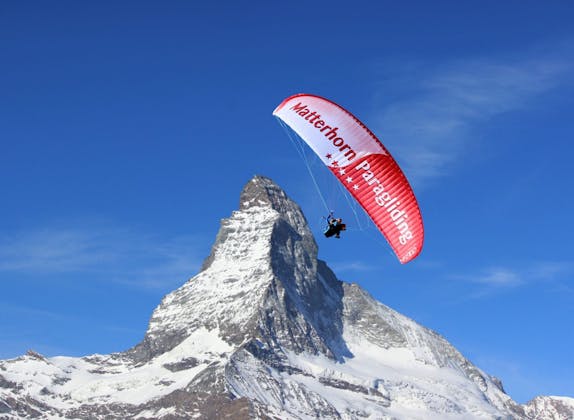
Duration: 2 hours

Validity: All day
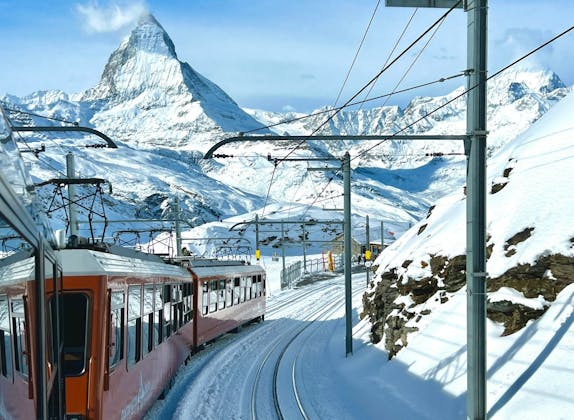
Validity: All day

Validity: All day

Duration: 2:10 hours

Ticket
High demandbooked 1,625 times

Adventure
High demandDuration: 2 hours
booked 118 times
Why book with Swiss Activities?

Ticket
High demandbooked 755 times

Adventure
Duration: 2 hours
booked 18 times
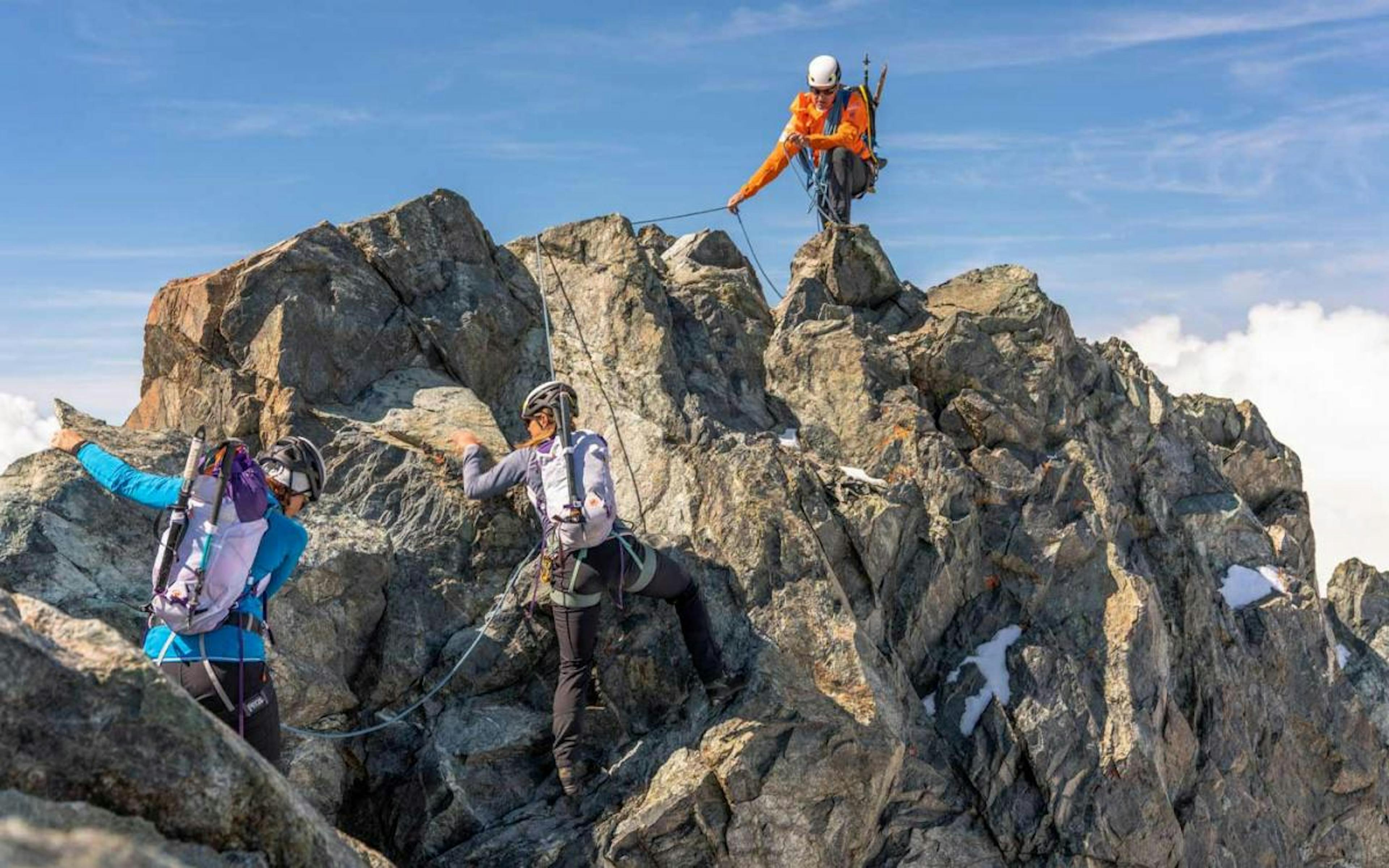
Tour
booked 106 times

Passports
booked 9 times
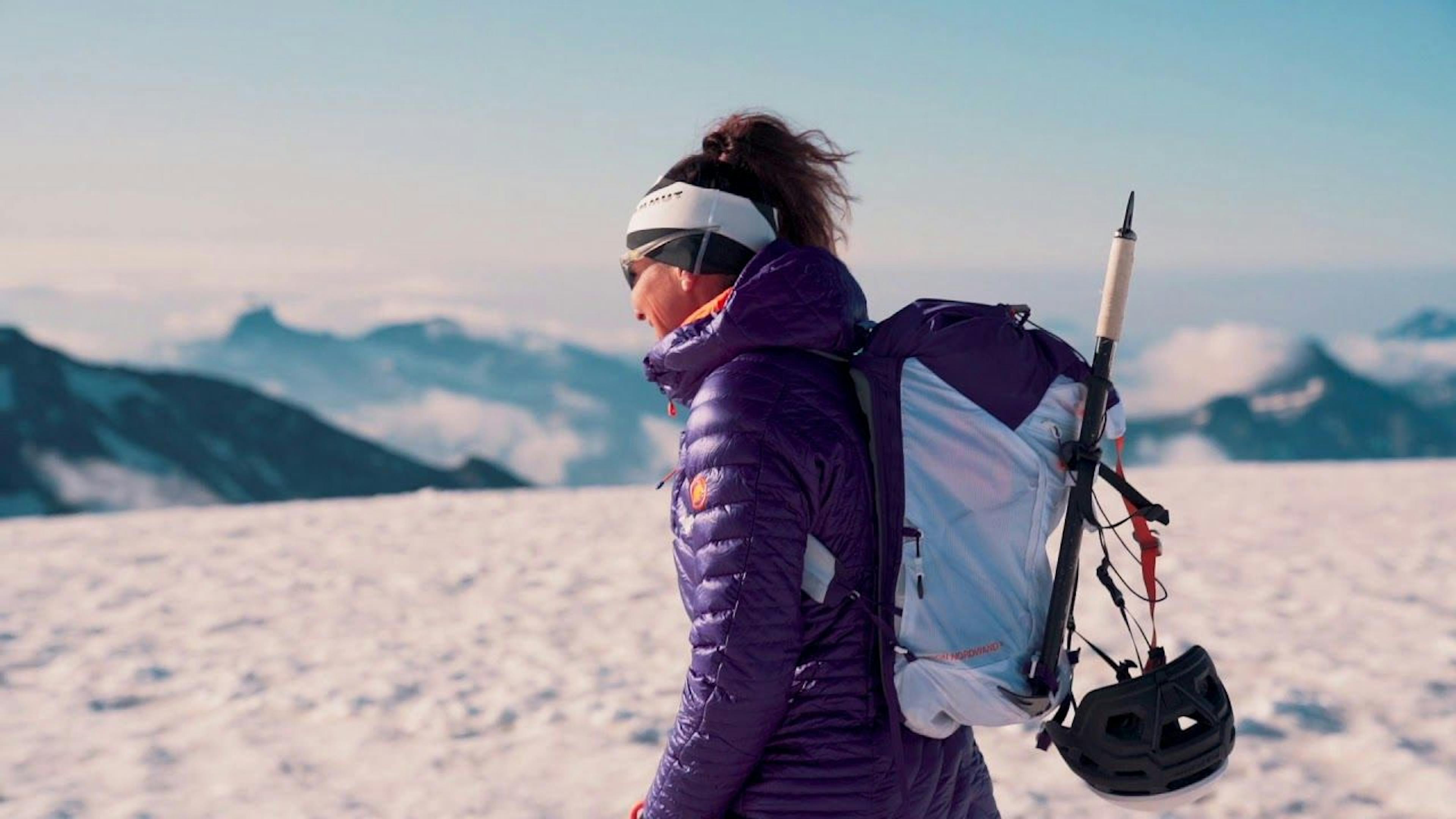
Tour

Games
Duration: 2:10 hours
Zermatt is known for its mountain giants. 38 of the total 48 four-thousand-meter peaks in Switzerland can be found in Zermatt. Therefore, Zermatt is a well-known mountaineering center. The glaciers in the high valleys of Zermatt still have wide and contiguous glacier areas, consisting of 22 glaciers, despite the glacier shrinkage
A comprehensive network of mountain railroads and lifts takes visitors directly up the mountains and into high alpine nature. The activities in Zermatt's mountain world are very diverse all year round. Not only for children there are many adventures to discover
Mountain hikers appreciate the magnificent hiking area of Zermatt, where seven wonderful mountain lakes are located between 2,100 and 2,800 meters above sea level. They are also particularly worth seeing next to the huge mountains with their glacier valleys. In them the high peaks are reflected and at the same time become uniquely beautiful photo motifs. The cold, clear and "thin" air offers a good view of the high mountain ranges everywhere. The 5-Lakes Trail is a popular hiking trail and is ideally suited for spectacular photos
The walkable Gorner Gorge shows the development since the last ice age. Here you can admire high waterfalls, beautiful rock formations and colorful water pools. For a change of pace, there is some culture in the car-free village of Zermatt, where ancient houses or the museum "Zermatlantis" await visitors in the old part of the village. The neighboring villages of Randa and Täsch are also worth a visit.
Zermatt is located in Valais and is the southernmost Swiss destination with German language. French and Italian are spoken to the left and right, respectively. From Zurich, a car journey via the A4 takes just under four hours
Zermatt is car-free. However, the car must be left in a parking garage in Täsch. To get to Zermatt you can take the Matterhorn-Gotthard-Bahn in 12 minutes. In the village of Zermatt, you can take an electric cab or the electric bus if your feet are no longer willing or able.
By train, you can even get to Zermatt from Zurich a little faster than by car: it takes 3.5 hours to reach the village of Zermatt. If you want to be active at high altitudes in Zermatt, you should plan at least 7-10 days for your vacation. The body needs some time to get used to the high altitude air
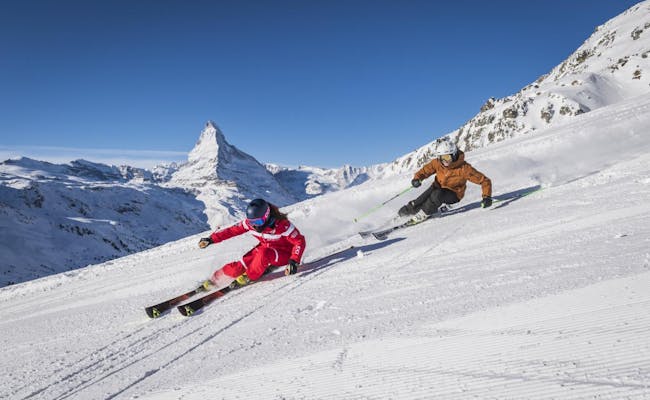 Skiing Ski Lessons (Photo: Zermatters)
Skiing Ski Lessons (Photo: Zermatters)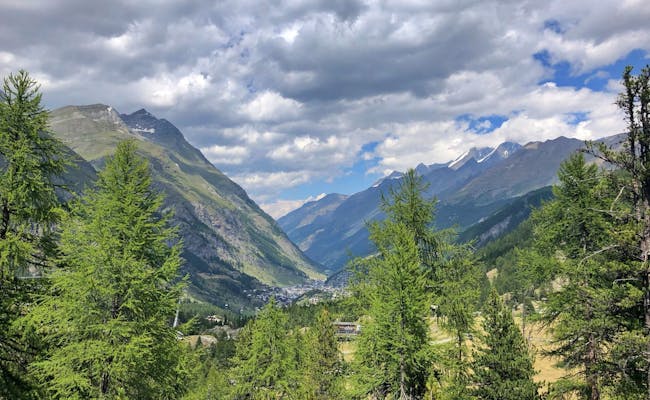 Hiking
HikingPlaces of interest in Zermatt include:
The car-free village of Zermatt offers two interesting museums. In the old part of the village there are thirty houses worth seeing, which have been preserved as a museum. They show the construction of the old Walser houses and their barns. Some of them are 500 years old. The Matterhorn Museum - Zermatlantis informs about the history of the Valais and the first ascent of the Matterhorn. Beautiful photo motifs can be found from the church bridge and the church stairs. At the church steps, the view of old wooden dwellings with the Matterhorn in the background can be captured. The church bridge gives a direct view of the mighty Matterhorn. The village of Zermatt is located at 1,610 meters above sea level.
The chapel “in der Wildi” was built in 1882 and dedicated to the Virgin Mary. It’s located right in the center of Randa. The white church features a stylized figure of Mary on the facade of its semicircular choir. A standout element is the open bell tower, topped with shingles in a pyramid shape, which houses the church bell from 1688. Inside, the small altar makes for a lovely photo opportunity.
The Lorihiischi is a former residence built in the middle of the 15th century in the traditional Wallis style. At the beginning of the 18th century, an additional floor was added. The building has remained in that state since then. Today, it serves as a historical living museum, providing insight into the past life of the farmers from this region.
A triple landslide in 1991 is commemorated both at the disaster site and in an exhibition in Randa. The photo gallery is freely accessible without an entrance fee, located in a former stable of the rectory.
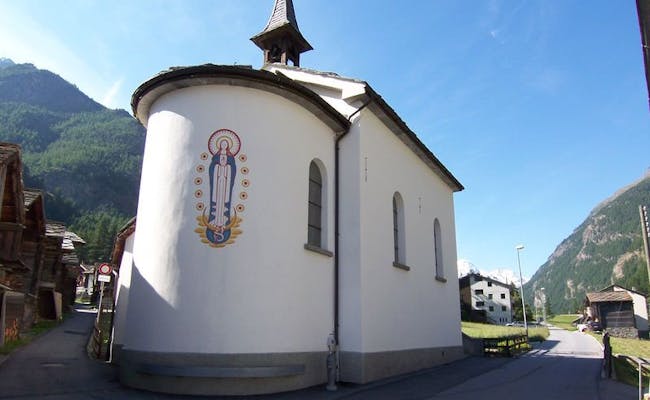 Chapel in the Wildi (Photo: Zermatt Tourism)
Chapel in the Wildi (Photo: Zermatt Tourism)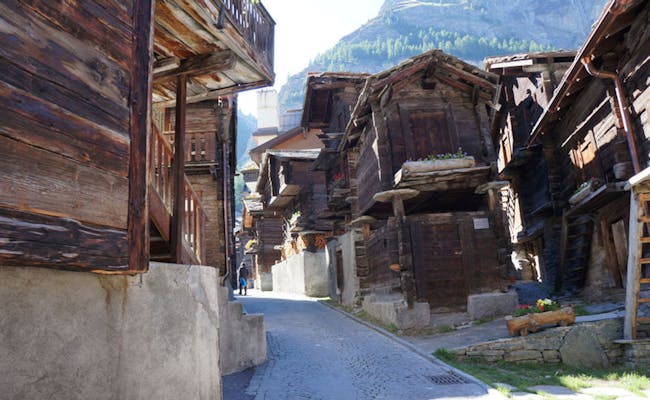 30 historical chalets (Photo: Zermatt Tourism)
30 historical chalets (Photo: Zermatt Tourism)The excursion destinations around Zermatt primarily include the towering mountains with their glacier valleys. The mountains are well-connected by cable cars, making them easily accessible from the village of Zermatt. Some particularly popular destinations are:
Located at 3,883 meters above sea level, the highest cable car station in Europe can be found at Matterhorn Glacier Paradise. From here, professional mountain guides lead hikers to the Breithorn, which stands at 4,164 m a.s.l.
The viewing platform at Klein Matterhorn offers a panoramic view that often extends to Mont Blanc in France, which is 4,810 m a.s.l. Matterhorn Glacier Paradise forms the peak of the year-round international ski area, which becomes Europe’s largest ski area in summer. The Theodul Glacier encompasses two glaciers that stretch between the Breithorn and the Matterhorn, known as the Upper and Lower Theodul Glacier, and is part of the Gorner Glacier system.
The glacier palace is also located in Matterhorn Glacier Paradise. It lies about fifteen meters beneath the surface of the Theodul Glacier and is accessible by a lift. Inside, you can see not only very old ice formations but also intricately carved sculptures in the ice.
Southeast of Zermatt is the Gorner Glacier, which is about 12 kilometers long. Its origin begins north of the Dufourspitze. The Grenzgletscher comes from the south of the Dufourspitze and joins the Gornergletscher. On the main ridge above this union stands the Monte Rosa hut, a popular stop on hikes
Other side glaciers united in the Gorner Glacier system are those between three and seven kilometers long:
The Gornergletscher system thus reaches an area of 41 square kilometers of glacier, which, however, continues to shrink due to increasing glacier melt. In 2007, the area was still about 54 square kilometers. The Grenzgletscher has even lost its direct connection to the Gornergletscher since the summer of 2019.
The Gornergletscher glacier system is a popular destination. Hikers, mountain bikers or paragliders look at the glaciers from afar, fascinated. More and more people are venturing directly onto the glaciers. This requires a professional guide, because dangerous crevasses and other pitfalls could otherwise easily lead to fatal accidents. Glacier hiking is a mixture of climbing and mountain hiking.
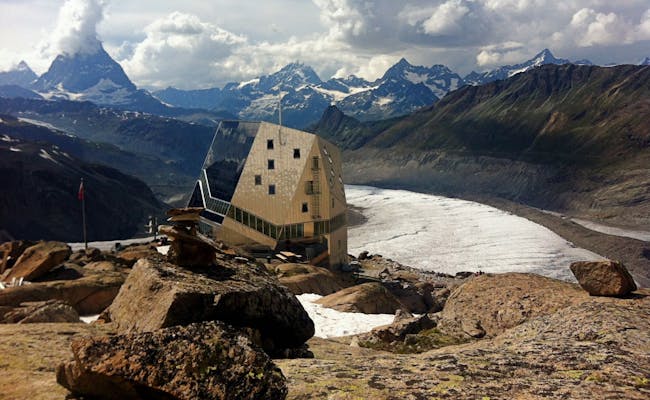 Monterosahütte Gorner Glacier (Photo by Gabriela Keusch)
Monterosahütte Gorner Glacier (Photo by Gabriela Keusch)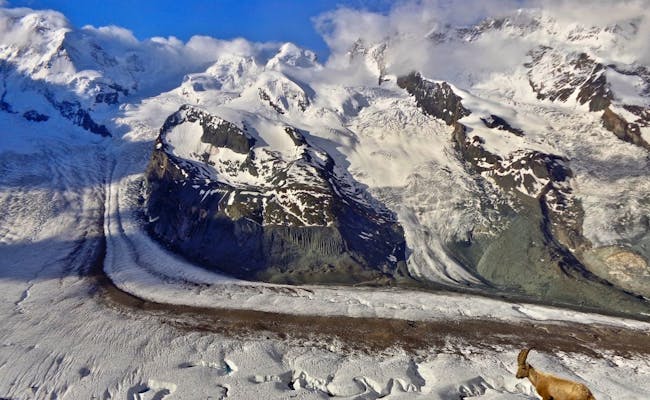 Gorner Grat Ibex (Photo by Gabriela Keusch)
Gorner Grat Ibex (Photo by Gabriela Keusch)The river Gornervispe, fed by melting glacial water, has carved out the Gornerschlucht since the last Ice Age. It continues to be eroded today. You can walk through the gorge in summer. In the upper section, the path is well secured with wooden walkways. You can see not only rock formations but also waterfalls and colorful water basins. The Gornerschlucht is open daily from 09:15 to 17:45 and costs 5 CHF (2.50 CHF for children) to enter.
The gorge is also great for canyoning under professional guidance. A special highlight is the ride on a long zip line through the gorge. The following Himalaya bridge consists of a narrow plank and two ropes (one on the right and one on the left). Another highlight of the via ferrata is a swing that allows participants to swing from one side of the gorge to the other.
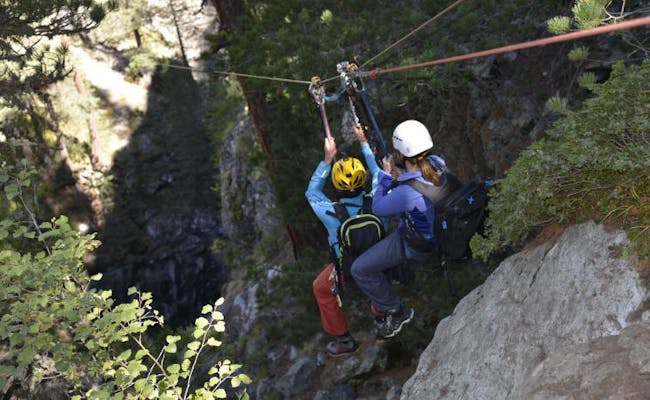 Via Ferrata Zip-Line (Photo: Zermatters)
Via Ferrata Zip-Line (Photo: Zermatters)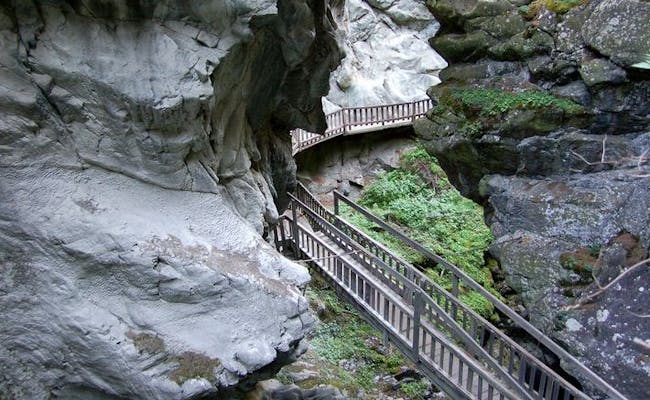 Gornerschlucht (Photo: Zermatt Tourism)
Gornerschlucht (Photo: Zermatt Tourism)Zermatt has over 150 lakes. These mountain lakes are situated above 2000 meters in altitude and vary greatly. In addition to clear lakes where you can observe the fish, there are also milky-looking waters, which come from glacial runoff. Just between Blauherd and Sunnegga, you can find five of these beautiful lakes along a designated hiking trail (11) that visits them one after the other.
The most famous lakes in the Zermatt area are:
Additionally, due to increasing glacial melt, there are nearly countless nameless dead ice lakes.
It is said that Gornergrat is one of those places you must see at least once in your life. Located at 3,089 m above sea level, it offers postcard-perfect views. The sight of the Matterhorn is particularly breathtaking and is among the best spots in Zermatt. The impressive Monte Rosa massif with its Dufourspitze, the view of the mighty Gorner Glacier, and 29 nearby peaks that rise above 4,000 meters are unforgettable.
You can reach the summit by taking the cogwheel train. The Gornergrat Railway is the highest cogwheel railway that operates outdoors. In just 33 minutes, it climbs nearly 1,500 meters from the Zermatt station. With a bit of luck, you might catch a marathon or half-marathon taking place around that time. These events are usually scheduled for early July and are celebrated with a small folk festival at the Zermatt station. On those days, a special spectator train runs between St. Niklaus and Zermatt, serving as a "moving grandstand."
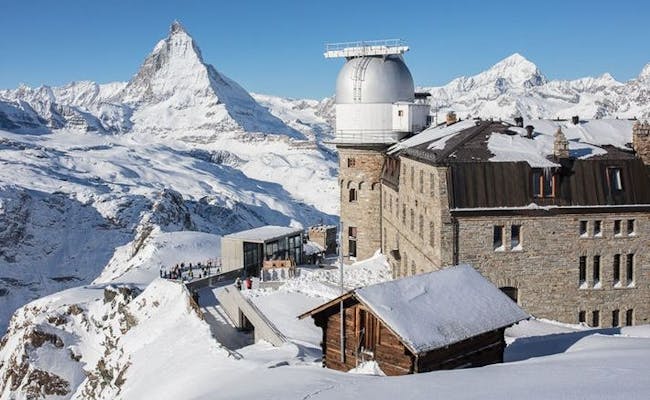 Gornergrat (Photo: Zermatt Tourism)
Gornergrat (Photo: Zermatt Tourism)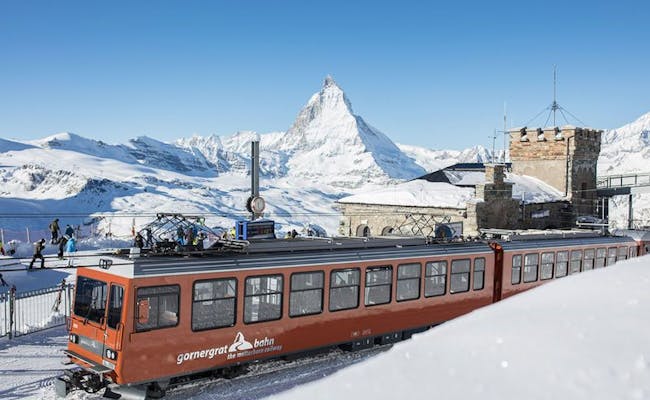 Gornergrat Bahn (Photo: Zermatt Tourism)
Gornergrat Bahn (Photo: Zermatt Tourism)The Lost Valley isn't easy to find. There are no signs or even a hiking trail leading here. If you're looking for the Lost Valley, it's best to take a local guide who can explain the glaciological and geological features of this valley with their insider knowledge. Such a hike is also very suitable for families with children aged 12 and up.
The valley offers opportunities for wildlife observation, hiking away from mass tourism, and beautiful photo spots. The Lost Valley is located near the Stockhorn, at the site where the Findel Glacier was and has already retreated.
The longest pedestrian suspension bridge in the Alps is about five hundred meters long, with a height of 85 meters at its highest point. It's located above Randa. A circular hike takes you across this bridge on a four-hour trek, and you’ll need to be absolutely free of vertigo to enjoy it. The bridge is 65 cm wide, with the floor made of grating. The path is open from May to October and closed in the remaining months. It should not be accessed during thunderstorms (risk of lightning). The best view of the 4,506 meter high Weisshorn can be enjoyed from the bridge. The Charles Kuonen Suspension Bridge is part of the two-day “Europaweg.” It’s also referred to as Europabrücke on trail signs.
When people talk about Rothorn, they usually mean the Unterrothorn. It’s located at 3,103 meters above sea level and can be reached by cable car from Zermatt via Sunnegga and Blauherd. There’s also a restaurant up there. Rothorn is a popular starting point for hikers. In winter, the highest point of the Zermatt-Rothorn ski area is marked by the Unterrothorn. The slopes here are very popular due to the sunshine.
Additionally, there’s the Oberrothorn at 3,414 m.a.s.l., which can only be reached on foot. There is a marked hiking trail, and the summit is completely free of ice in summer. The hike to Oberrothorn takes about five hours from Zermatt. From the summit, you can see the nearby peaks of over 4,000 meters very clearly.
Schwarzsee is situated at 2,583 m.a.s.l. and has a cable car station next to the lake. You can reach it from Zermatt in just 12 minutes. Schwarzsee is the starting point for climbing the Matterhorn. The Matterhorn Glacier Trail also begins here. Next to the lake is the chapel "Maria zum Schnee", which is often visited by climbers after successfully conquering the Matterhorn. From Schwarzsee, there’s also a hiking trail to Hörnlihütte. In winter, Schwarzsee is right by the slopes. The Schwarzsee restaurant has a sun terrace.
Located at 2,288 m.a.s.l., Sunnegga can be reached from Zermatt via a funicular through a rock tunnel in under 5 minutes. The view of the Matterhorn from here is especially stunning. Sunnegga is particularly family-friendly. A lookout point for marmots, complete with information boards, is a short walk away. The clear Leisee is a favorite swimming spot, especially for families. In winter, winter sports take place further up, but the sun terrace is a popular spot to relax. The Wolli beginner park in Sunnegga is suitable for novice skiers, and Sunnegga is also the starting point for winter hikes and snowshoe trails.
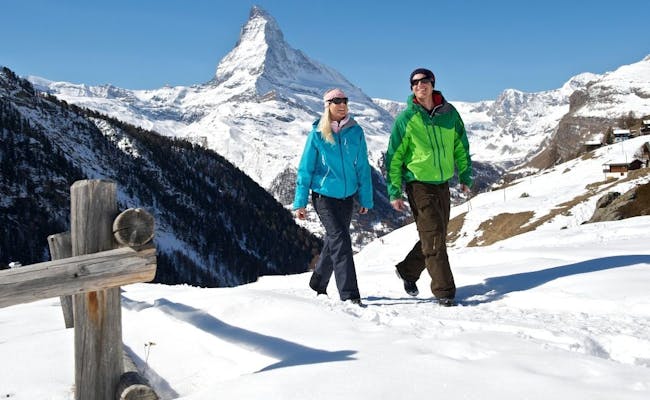 Sunnegga Matterhorn (Photo: Zermatt Tourism)
Sunnegga Matterhorn (Photo: Zermatt Tourism)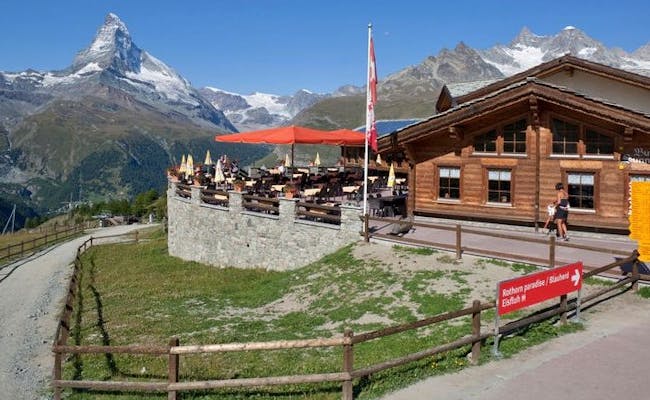 Sunnegga Restaurant Matterhorn (Photo: Zermatt Tourism)
Sunnegga Restaurant Matterhorn (Photo: Zermatt Tourism)In Zermatt there are some tips that will make your stay even more enjoyable. Among them are opportunities for exceptional photo motifs (with and without camera) at certain times or in special places.
Skiing in summer
In the summer ski area all international athletes of speed disciplines train regularly. If you want to see them, you have a sure chance to do so on the Matterhorn Glacier Paradise.
Sunrise
From the church steps in the village of Zermatt, the view of the Matterhorn during sunrise makes for a particularly impressive spectacle. The sun first appears at the summit and then seemingly moves down the east face of the Matterhorn.
Gornerschlucht
If the Gorner Gorge is visited from mid-October between 3:00 and 4:00 p.m., the water shines in turquoise blue due to the special light conditions
Animal Observations
For animal observations, a hike in the late afternoon from the Blauherd station to the Oberrothorn is worthwhile. Kristallweg or Panoramaweg are equally suitable. As soon as the cable cars stop, ibexes and marmots appear. The way down, however, can only be done on foot.
Special ski run
The ski slope 69 runs as close to the Matterhorn as no other slope.
 Skiing in Zermatt (Photo: Zermatt Tourism Pascal Gertschen)
Skiing in Zermatt (Photo: Zermatt Tourism Pascal Gertschen)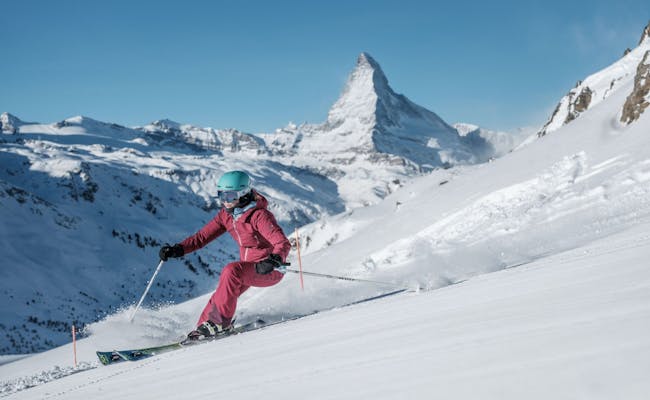 Skiing in Zermatt (Photo: Zermatt Tourism Pascal Gertschen)
Skiing in Zermatt (Photo: Zermatt Tourism Pascal Gertschen)Zermatt is a paradise for winter sports enthusiasts all year round. While other ski resorts have closed for the season, athletes from all over Europe and even the world train here at the Matterhorn Glacier Paradise during the summer. At the Gornergrat, various marathon and half-marathon competitions take place several times a year, accompanied by small local festivals.
It's definitely worth it to check out a ski school in Zermatt. For the little ones, there's the Snowli Kids Village Zermatt, where kids as young as 4 to 6 can take professional ski lessons. For teenagers, there's the Cool Teens Camp Zermatt.
Paragliding in the Zermatt region is a unique experience. If you're not up for a tandem flight, you can also book a helicopter tour to soak in the special atmosphere of the 4000-meter peaks.
Kid camps are offered in Zermatt, providing activities and games for children of similar ages. The summer camp lasts 5 days and does not include overnight stays. Supervision is provided during the day, typically between 9 AM and 4 PM.
If you're not great on foot, especially in summer, you can take advantage of one of the cable car combo tickets. This allows you to get around the Zermatt area with ease.
The Glacier Express lets you travel from Zermatt to St. Moritz on the "slowest fast train in the world." It's a scenic journey with large panoramic windows.
The "Matterhorn Ski Paradise" - as the ski area of Zermatt - consists of these three large ski regions:
The Matterhorn Glacier Paradise is accessible from Zermatt via a cable car to Trockener Steg. An additional three-rope lift from Trockener Steg increased the capacity from 600 to 2000 people per hour. The mountain station is located at 3,820 m above sea level. Visitors reach the southerly ski area through a tunnel.
Snow tubing is offered in summer at Matterhorn Glacier Paradise. It is located at the mountain station, where inflatable tubes with handles are provided free of charge above the tubing slope. This snow tubing is suitable for children from six years old, but adults also enjoy it.
Schwarzsee Paradise is reached from Zermatt via the modern Matterhorn-Express gondola lift to Furi. The Matterhorn-Express continues on to Trockener Steg.
The cogwheel train from Zermatt takes you to Gornergrat (3,089 m above sea level) via Riffelalp (2,222 m above sea level) and Riffelberg (2,600 m above sea level). The ski area mainly features red and blue pistes, making it particularly suitable for families with children from Gornergrat to Riffelberg.
Rothorn Paradise is accessed from Zermatt by the funicular railway to Sunnegga. From Sunnegga, cable cars go via Blauherd to Unterrothorn. Locals refer to Rothorn as the "chocolate side of the Matterhorn." In the ski area around Sunnegga, beginners are trained at the ski school of the experience and beginners' park, while advanced skiers come down from Rothorn.
All areas are connected via the Furi-Riffelberg lift.
The Italian ski area of Breuil-Cervinia also has direct access to the Zermatt ski area. East of the village, the skier's chairlift Bontadini begins, with a mountain station at the Col de Sommeiller pass. Every year, the motorcycle gathering Stella Alpina takes place here on the second Sunday of July. It is the highest motorcycle rally in the world at 3,000 m above sea level.
The two longest descents are:
The most challenging descent (No. 62) covers 565 vertical meters between Furgg and Furi over just three kilometers.
A winter snow park is available on the Theodulgletscher near the Furggsattel glacier lift. Here you will find:
The Beginner Line features twelve boxes and twelve jumps at an easy level. The Rail Garden offers eight rails, and the Slopestyle has three rails and three jumps with intermediate to professional levels.
The Matterhorn Glacier Paradise hosts the highest summer ski area in the Alps. Here, winter sports can be practiced year-round, making the area popular as a training site for many athletes from Europe and around the world.
At the foot of the Klein Matterhorn lies the Snow Park Zermatt, also known as Gravity Park. Snowboarders and freestylers can enjoy the snow here in summer.
Facilities include:
The mega halfpipe allows for acrobatic figures against the walls, the slalom area helps maintain precision and power, and the jump area provides the opportunity to practice both flat and high jumps. On the Plateau Rosa, you can find 15 rails, 7 boxes, and 10 jumps (including 2 small, 5 medium, and 3 large). A 15 by 15 meter wide and 3 meter high airbag helps to perfect high-speed jumps safely.
Heliskiing is a special type of skiing and snowboarding. A helicopter takes the athlete to a mountain peak, and from there, they descend through untouched snow. The descent is guided by experienced instructors. Avalanche transceivers and climbing harnesses are provided.
In Zermatt, two companies offer heliskiing: Zermatters and Air Zermatt.
Zermatters offers flights to the following mountains:
With Air Zermatt, flights to these mountains are possible:
In Zermatt, flight schools offer not only tandem flights but also pilot training in paragliding. Besides the unique feeling of flying, paragliding in Zermatt has a special feature: it offers a direct view of the Matterhorn and 37 other peaks over four thousand meters high. Paragliding is possible all year round and starts from various mountain peaks. Tandem flights from one of the four-thousanders are considered particularly spectacular.
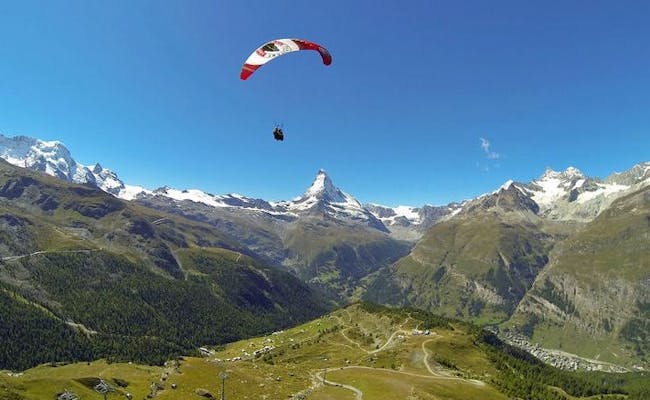 Paragliding (Photo: Zermatt Tourism)
Paragliding (Photo: Zermatt Tourism)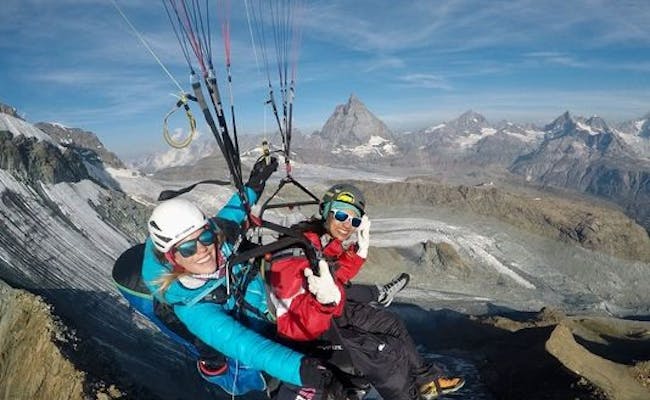 Paragliding (Photo: Zermatt Tourism)
Paragliding (Photo: Zermatt Tourism)There are four hundred kilometers of hiking and mountain trails in the Zermatt-Matterhorn region, hiding at least 365 different paths. They are distinguished by color: hiking trails (yellow), mountain hiking trails (red), and alpine hiking trails (blue). A lovely two-day hike takes you from Grächen to Zermatt. The Europaweg trail runs through the Mattertal and features the longest suspension bridge in the Alps.
Below are some of the most spectacular and beautiful day hikes:
Randa – Hauspil – Suspension Bridge – (Europahütte) – Gere – Randa
Starting from Randa station, the trail number 69 marked “Europabrücke” first leads you to Hauspil. The path winds through larch forests and passes the viewpoint “Hohtschuggen.” The suspension bridge is just under 500 meters long, with the crossing taking about ten minutes. The floor consists of grids, so being free from vertigo is a must. A detour to the Europahütte, which stands on stilts, is possible from here. The descent goes via Gere back to Randa station. The site Europaweg shows whether the suspension bridge is currently open.
Facts:
The period from June to September is great for a hike from one lake to another. Trail number 11 starts at the cable car station Blauherd at an altitude of 2,571 m.a.s.l. You first take the funicular to Sunnegga. Then, you continue with an eight-person gondola and a six-person chairlift to Blauherd. The path ends after just under ten kilometers at the station of the funicular in Sunnegga at 2,288 m.a.s.l. From here, it's about a 4.5-minute gondola ride to Zermatt.
The trail leads you to these lakes in order:
If you start the trail in Sunnegga, take the Marmot Path first and turn right just before the Blauherd cable car station towards Stellisee.
This hike involves either descending only or, on the return path, ascending. The descent is accompanied by direct views of the Alpine panorama. In the mornings and evenings, there’s a high chance of spotting chamois. The descent starts at Rothorn (3,103 m) and ends in Tufteren (2,215 m.a.s.l.). Rothorn (Unterrothorn) can be reached from Zermatt via Sunnegga and Blauherd directly by gondola in half an hour. From Tufteren (Zermatt Wichje), take bus 572 back into the village of Zermatt.
Facts:
A short hike that brilliantly showcases all the surrounding peaks. It’s not just for those who can’t walk too far anymore. The start and end points are at the viewing platform behind the Kulm Hotel.
Facts:
Climbing a four-thousander is a special dream for many people. After just a few hours of climbing, the goal is reached. Even non-alpinists can conquer a 4,000-meter peak with moderate effort. This mountain tour is considered moderately difficult but shouldn’t be underestimated. It should only be undertaken by experienced mountain hikers who are sure-footed. The thin air at 4,000 meters can be challenging for many. The journey begins at Klein Matterhorn at 3,883 meters above sea level, with Breithorn at 4,164 m.a.s.l. Guidance by an experienced and local mountain guide is essential.
Facts:
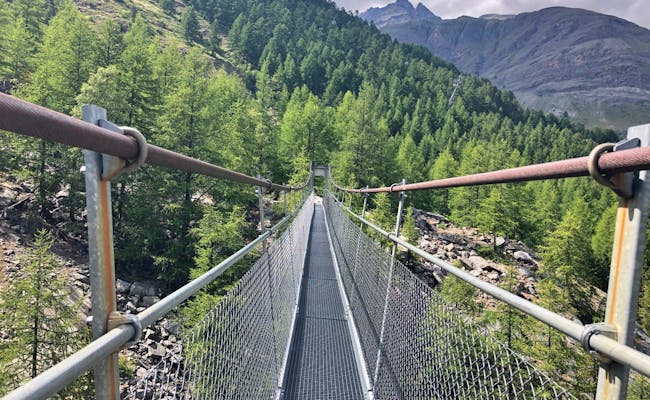 Suspension Bridge Europabrücke
Suspension Bridge Europabrücke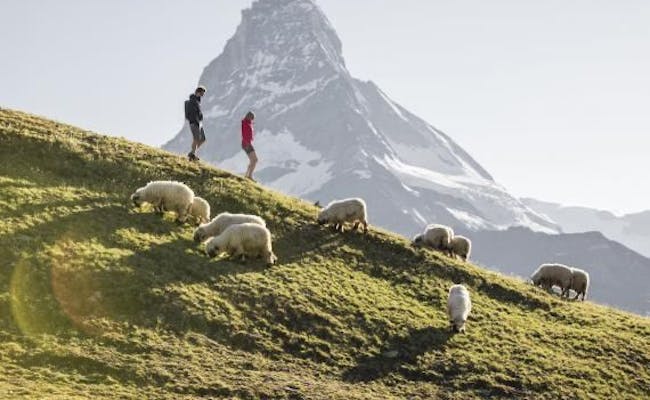 Hiking (Photo: Zermatters)
Hiking (Photo: Zermatters)Glacier hiking in Zermatt is offered under the professional guidance of experienced mountain guides of Zermatt. In the small groups, children from the age of 12 can also go along. Glacier hikes lead over the Lower Theodul Glacier, to the Monte Rosa Hut with Gorner, Grenz and Monte Rosa Glaciers or over the Gorner Glacier. On the way, insider knowledge is imparted, for example about the formation of moraines and crevasses. Glacier hikes are a mixture of mountain hiking and via ferrata walking. Trees, footbridges, rocks and abseils are overcome. Proper equipment, fitness and surefootedness are important prerequisites.
This hike starts with the ride with the mountain railroad Matterhorn - Express to Trockener Steg. The Lower Theodul Glacier is about seven kilometers long and one kilometer wide. The glacier is reached via a ten-meter abseil that leads to the via ferrata of the gorge. Tyroliennes are also used in the gorge. The way back to Zermatt is a rather leisurely hike in the end.
Facts
The Gornergratbahn takes you from Zermatt first up to Rotenboden (also called Roten Boden). From here a natural path leads down to the Gorner glacier. The rest of the hike leads across the glacier to Furi. You will walk over snow and ice and you can hear the crackling and cracking of the ice under tension. At the end of Furi, the train takes you back to Zermatt.
Facts
This trekking is offered for two days. The Gornergratbahn runs from Zermatt to Rotenboden. From here, a nature trail leads to the Gorner glacier, where you walk to the hut. The Monte Rosa hut stands at 2,883 m.a.s.l. at the foot of the Monte Rosa massif and above the confluence of two glaciers. The Grenzgletscher joins here with the Gornergletscher. The view of the mountains shows, besides the Matterhorn, especially the Breithorn and the twins Castor and Pollux. There are 120 overnight places in the Monte Rosa hut. The following day, the Gornergratbahn takes you back to Zermatt via Rotenboden.
Facts
From the Monte Rosa hut there is the possibility to walk over the west ridge to the Dufourspitze in the Monta Rosa area. At 4,634 m.a.s.l., the Dufourspitze in the Monte Rosa massif is the highest four-thousand-meter peak in Switzerland. It is reached exclusively on foot and is reserved for alpinists accompanied by professional mountain guides.
Trail running is very popular in the Zermatt area. Six mostly very challenging tours are officially available here.
These include:
The Marathon is held between St. Niklaus (1,116 m.a.s.l.) and the Riffelberg (2,585 m.a.s.l.). The route through the Mattertal valley via Randa and Täsch to Zermatt is considered a half marathon with 600 meters of altitude to be reached. The further course leads steeply upwards to the Sunnegga and from there almost evenly further to the Riffelalp lying 2.222 m.a.s.l.. On the further way to the Riffelberg, the course is partly run directly next to the streetcar line there. The last three kilometers of the marathon up to Riffelberg offer a direct view of the Matterhorn. More than 1800 meters of altitude are overcome in total. As an increase, the further run up to the Gornergrat (3,089 meters) is possible. It is called ultramarathon. All routes can be run at any time in summer.
Facts about the marathon:
This run is a folk run, which is combined with a big, cosy folk festival on the Täschalp every year in July. It can be run at any time outside the folk festival. The run starts in Täsch (1.450 m.a.s.l.) and ends on Täschneralp (2.214 m.a.s.l.).
Facts about the Täschalp run:
Zermatt - Ried - upper altitude trail - Sunnegga - Riffelalp - Blatten - Zermatt
Start and finish of this easy trail is Zermatt. The run runs largely west of the Vispa River and has nice spectator spots. The official races are held every year in August. Beginners can handle this route well.
Facts about the easy Matterhorn Ultraks Trail Active:
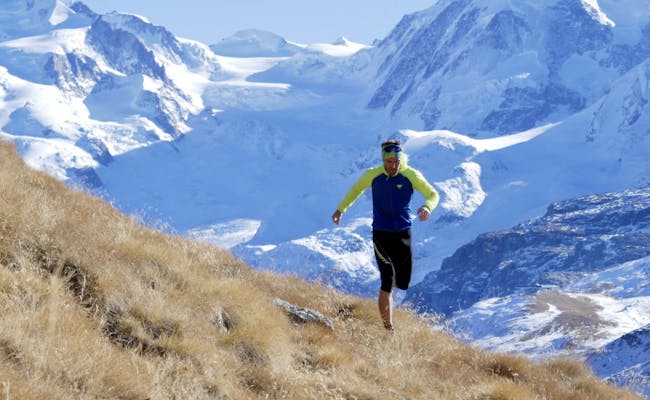 Trail Running Zermatt (Photo: Zermatters)
Trail Running Zermatt (Photo: Zermatters)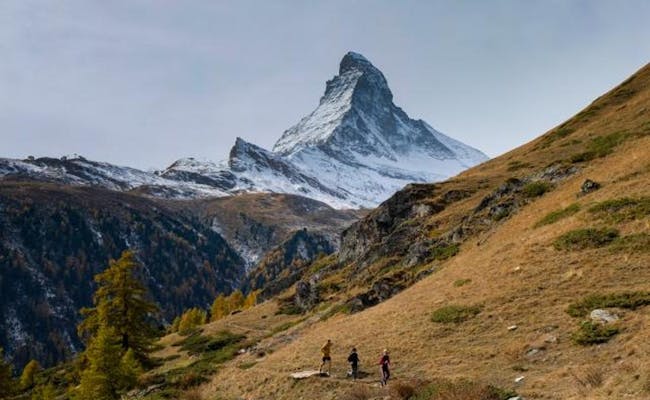 Trail Running Zermatt (Photo: Zermatters)
Trail Running Zermatt (Photo: Zermatters)A via ferrata has been created in Schweifinen above Zermatt village with three routes. All three routes (A, B and C) require different skills. All sections are open from June to October.
This route is already open for children who have reached the age of ten.
Facts:
Access is via Bahnhofstrasse from the village of Zermatt. The hiking trail branching off in the direction of Edelweiss and Trift leads upwards. Before the bridge over the Triftbach, turn right to the entry point. The entry point at Turuwang is signposted. At the finish point is the Beresina hut. the descent to the village is signposted.
The route B can be directly connected to the route A. It is intended for experienced via ferrata climbers. The most important part is a vertical and smooth rock face, which is partly overhanging. In addition, there are swaying logs that have to be crossed
Facts:
The access is the same as for tour A and is signposted.
The route C can be directly connected to the routes A and B. It is intended for experienced via ferrata climbers. The most important part is a vertical and smooth rock face, which is reached via a wobbly and back-and-forth swinging wire rope ladder. Iron bars carved into the rocks provide the only support to overcome traverses.
Facts:
The access is the same as for tour A and is signposted.
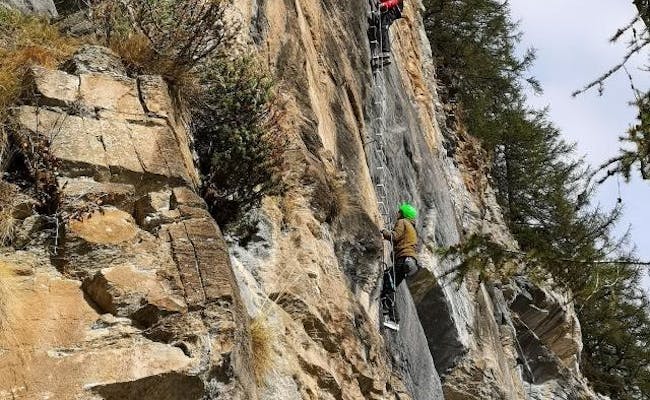 Via ferrata (Photo: Zermatters)
Via ferrata (Photo: Zermatters) Via Ferrata (Photo: Switzerland Tourism MySwitzerland)
Via Ferrata (Photo: Switzerland Tourism MySwitzerland)The terrain in Zermatt, situated between approximately 1,400 and 3,000 m above sea level, is perfect for tours on a mountain bike or E-bike. This primarily includes the areas around Gornergrat, Schwarzsee, and Sunnegga/Rothorn. From May to October, most mountain lifts also transport bikes. It's recommended to make a prior inquiry.
For mountain bikers and E-bike riders who are not yet pros at mountain biking, professionally guided bike tours are available. In mostly two-hour trails, exercises, techniques, and tricks are taught.
Easy bike tours:
moderately difficult tours:
difficult tours:
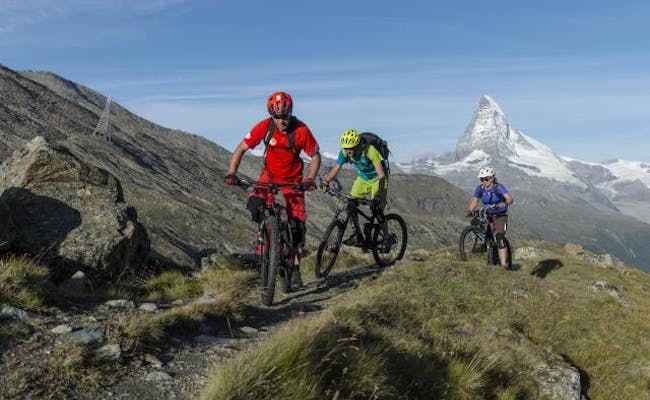 Mountainbike (Photo: Zermatters)
Mountainbike (Photo: Zermatters)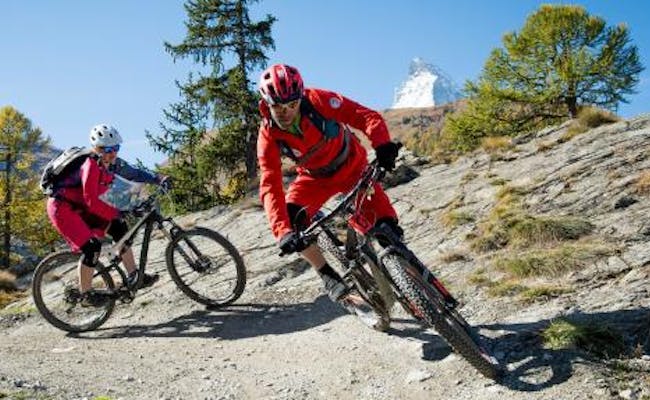 Mountainbike (Photo: Zermatters)
Mountainbike (Photo: Zermatters)Winter hiking and snowshoeing trails are often combined, as the following small selection shows. The routes shown always end at one or more restaurants.
This snowshoe tour starts with a winter hike from Sunnegga to Findeln. In Findeln the snowshoes can be put on; because it goes into the untouched nature. At first the trail leads slightly downhill to a bridge. After the bridge it leads into a Swiss stone pine forest, which leads up to Riffelalp.
Facts:
The hike starts directly at the mountain station Rotenboden. Facing the valley, it leads left along the tracks to the snow-covered Riffelsee, the Riffelhorn is clearly visible. Halfway along the trail, the Matterhorn can be admired and photographed. At the Riffelberg is the end point of the hike.
Facts:
This tour starts at Gornergrat and leads down directly along the railroad tracks. The correct route is marked every 100 meters with a pink pole.
Facts:
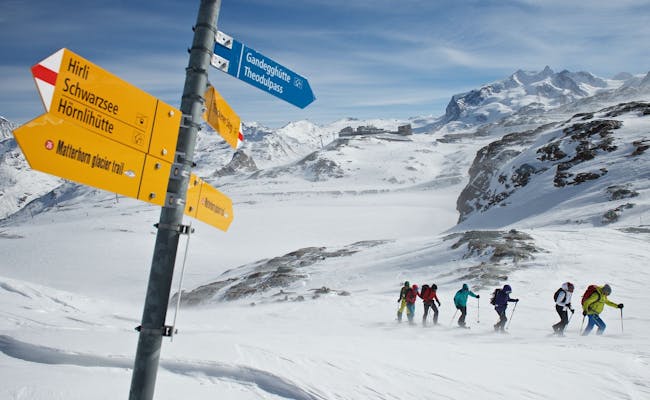 Snowshoe hiking (Photo: Zermatt Tourism Michael Portmann)
Snowshoe hiking (Photo: Zermatt Tourism Michael Portmann)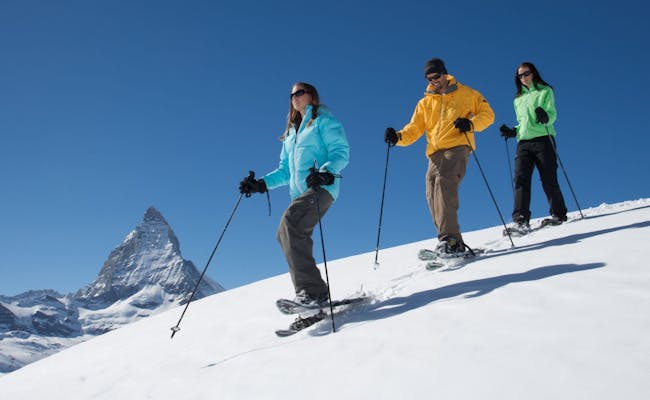 Snowshoeing (Photo: Zermatt Tourism Marc Weiler)
Snowshoeing (Photo: Zermatt Tourism Marc Weiler)There are several beautiful toboggan runs available from December to April. The ride from Gornergrat to the valley is particularly picturesque, offering sledders a direct view of the Matterhorn.
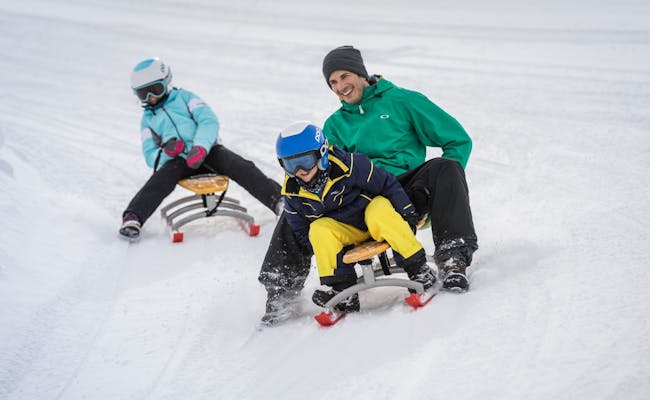 Sledding (Photo: Zermatt Tourism Pascal Gertschen)
Sledding (Photo: Zermatt Tourism Pascal Gertschen)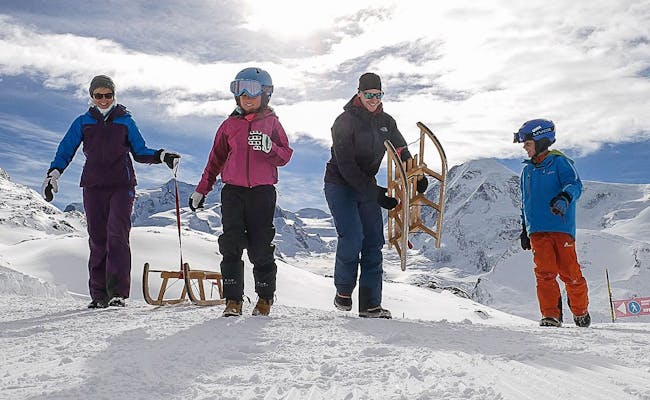 Sledding (Photo: Zermatt Tourism Tom Malecha)
Sledding (Photo: Zermatt Tourism Tom Malecha)Events and activities in the region of Zermatt are very diverse. In addition to sporting events, musical and other artistic events are offered. However, Swiss tradition is not neglected either.
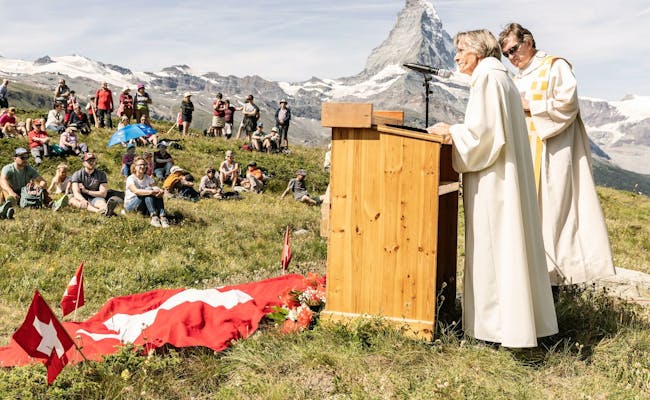 National Day Matterhorn (Photo: Zermatt Tourism Pedro Rodrigues)
National Day Matterhorn (Photo: Zermatt Tourism Pedro Rodrigues)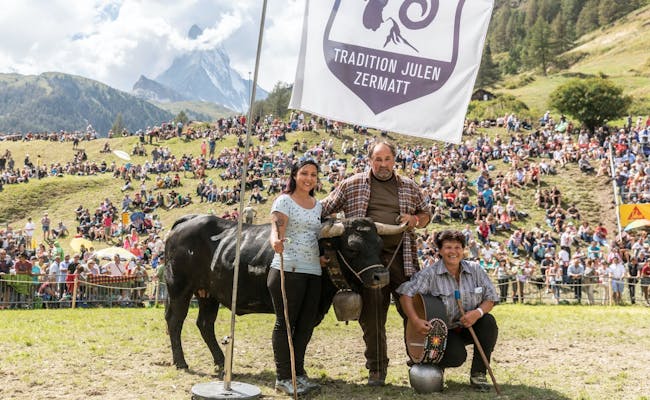 Ringkuhkampf (Photo: Zermatt Tourism Pedro Rodrigues)
Ringkuhkampf (Photo: Zermatt Tourism Pedro Rodrigues)Zermatt is a popular tourist area. This is also reflected in the number of restaurants and pubs. In the village of Zermatt alone there are about 100 restaurants. In addition, there are about 50 mountain huts and alpine pubs. They mainly offer traditional and local Swiss cuisine. However, the popular Swiss classics should not be missed. Cheese fondue, raclette, rösti or Älplermagronen taste especially good after sporting activities. Swiss cuisine is a good mix of German, northern Italian and French dishes. International cuisine is also available. At least three restaurants serving Asian food can be found in Zermatt. The following selection of restaurants offers a small taste.
The Sonnmatten restaurant offers home-style dining during the summer and winter months. The motto is "simple and good". The kitchen uses daily fresh products from the region, which should be healthy, down-to-earth and varied. Hot food is offered in the summer from 12:00 to 21:00 (Wednesday day off). Open until 23:00. On the sun terrace there is the view of the Matterhorn for free. The lemonades, freshly prepared daily with fruits and herbs, are especially popular. There are 80 seats inside and 100 outside. In the winter season the restaurant opens one hour earlier.
Right next to the valley station of the gondola lift, the Pizzeria Klein Matterhorn tempts you with fresh pizza from the charcoal oven. The predominantly Italian cuisine is offered hot throughout between 11:30 am and 10:00 pm (open daily until 11:00 pm). It is a good idea to stop here first after physical activities and the downhill ride before heading to the hotel
The Adler Hitta is located on the Findeln Alp at an altitude of 2200 meters. It is known for its delicious grilled dishes, for example the Mistchratzerli. A large terrace seats 120, and inside there are another 120 seats. A large lounge with bar offers deck chairs for sunbathing. The view of the Matterhorn is spectacular. Since it has an e-bike charging station, charging time can be pleasantly shortened. Open daily from 9:00 am to 5:00 pm, hot food is available between 11:00 am and 5:00 pm.
The Adler Hitta is located directly on the hiking trail between Zermatt and Findeln. In winter the ski slope Sunnegga-Findeln runs through here. The mountain railroad to Sunnegga shortens the walk to 15-20 minutes
Directly at the station square of Zermatt, the bistro bar with 50 seats opens from 7:00 am to 10:00 pm. Hot food is available between 11:00 am and 9:00 pm. At noon, a lunch plate is served from 18 CHF, before that you can enjoy sandwiches or coffee and croissant. The bistro bar is part of the Hotel Gornergrat.
Located in Zermatt's Bahnhofstrasse, the brasserie offers very uncomplicated French cuisine. The Matterhorn is in view on the terrace. Open between 12:00 And 22:00, warm cuisine until 20:30. Specialty of the gourmet cuisine is fish. The summer season here goes from the end of May to mid-September, in winter is open again from the beginning of December.
The 350-year-old Zum See restaurant has a small kitchen. Nevertheless, gourmet dishes are conjured up here and the restaurant in the small hamlet of Zum See is a worthwhile destination. In addition to traditional dishes, mainly Mediterranean dishes are offered. Those with a sweet tooth will get their money's worth here with dessert. The crème cake, made fresh daily, is legendary. Anyone who is in the vicinity should not miss out on trying it.
Open in summer from mid-June to early October and in winter from mid-December to mid-April. The restaurant has 75 seats inside and 120 outside. Open daily from 10:00 - 17:00, hot food is served between 11:30 and 17:00.
The restaurant Zum See can be reached from Zermatt by cable car to Furi. Afterwards it is a 600 meter walk.
Chez Vrony is one of the best restaurants in Zermatt and offers gourmet cuisine on the slopes. Chez Vrony is located at 2130 meters above sea level in Findeln. Only organic own products are used and house sausage, dried meat and alpine cheese are produced by Chez Vrony according to old, traditional recipes. The cattle are fed exclusively on alpine grass. Popular dishes here include the Rösti-Hörnli pan or the ravioli with mountain goat cheese. there are 170 seats both inside and outside. The view of the Matterhorn is a pleasant addition. Open in summer from mid-June to mid-October, Chez Vrony is open daily from 10:00 am - 5:00 pm. In winter from the beginning of December to mid-April daily from 10:00 - 16:00. At noon, food is served in two times: between 12:00 and 14:00 and between 14:00 and 16:00.
From Sunnegga in summer you can reach Chez Vrony in 30 minutes on foot. In winter you take the ski slope no. 6.
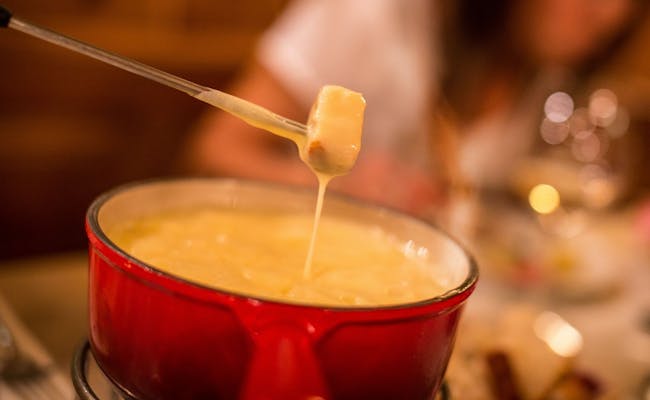 Fondue (Photo: Zermatt Tourism Pascal Gertschen)
Fondue (Photo: Zermatt Tourism Pascal Gertschen)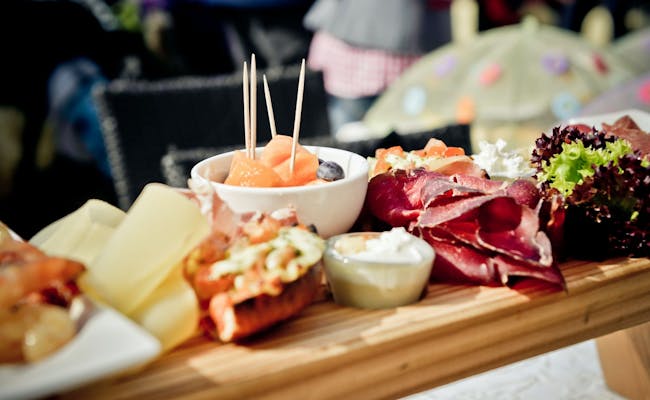 Food (Photo: Tradition Julen Restaurant Stafelalp)
Food (Photo: Tradition Julen Restaurant Stafelalp)There are 131 hotels in Zermatt alone. In addition, there are far more than 1000 vacation apartments
For a special luxury vacation, Zermatt has six five-star hotels to offer. All of them have spa wellness. The Riffelalp Resort is one of them and even stands at 2,222 meters above sea level. 45 hotels offer comfort and good service with 4 stars and another 45 three-star hotels give above all coziness....
With 70 rooms and suites, the Hotel Riffelalp Resort is located in the middle of the hiking, skiing and biking area. The ski slopes are reached directly from the hotel. The hamlet Riffelalp is reached from Zermatt with the Gornergratbahn. Afterwards, the 865-meter-long Riffelalptram takes you directly to the hotel. The Riffelalp Resort has the highest outdoor pool in Europe (35°C warm). Ski and bike rental are available directly at the hotel
In the middle of the village of Zermatt stands the four-star Hotel Julen. It has its own SPA area and two restaurants. The herd of black-nosed sheep belonging to the hotel grazes in summer on one of the three pastures (at an altitude of 2,400 meters). Hotel guests can visit the sheep every Wednesday. The hotel offers 32 rooms, an elevator is available. Pets are also allowed here.
The four-star hotel Chesa Valese has a rather small SPA area. The 23 rooms are newly designed in alpine style with lots of wood and large balconies offer comfort. There are rooms with direct Matterhorn view.
The small three-star hotel has 13 rooms and two Valais barns. The hotel stands in a beautiful garden not far from Zermatt's Bahnhofstrasse. A rustic furnished house bar invites you to relax.
With 25 rooms, the three-star Hotel Bellerive also offers a small SPA area. Children under 9 sleep free of charge in their parents' room. Sleds and hiking poles are rented free of charge and against boredom the hotel offers a media library with 300 DVDs. This then also fits the free late riser breakfast brought to the room until 11 o'clock.
In Furi in the midst of the moving, ski and Bikegebiet stands the three-star hotel Silvana Mountain. The SPA area here offers an experience with whirlpool and float areas under the starry sky at 34 °C water temperature. The hotel has 21 rooms, a chalet and a lodge. Dogs are allowed in the hotel. The hotel includes the well-known mountain restaurant Gitz-Gädi with a variety of lamb and goat specialties, but also fondue and vegetarian cuisine are not neglected. The hotel is reached by cable car from Zermatt to Furi. About 450 meters are to be walked.
The vacation apartments also have a high proportion of 5-star classifications with 130 houses. 384 houses have 4 stars and the 3-star houses are in the absolute majority with 516. Some large apartment houses combine a large number of the vacation homes. These include the 5-star apartment house La Bohème, the Chalet Altesse (5 stars) and the Chalet Merlin (4 stars) For those who want to save money, there are still more than 100 houses with two and less stars to choose from.
The four-star house lends itself to chilling out. A heated outdoor pool and a terrace with sun loungers, parasol and gas barbecue make the stay outdoors perfect. In winter, a wood-burning stainless steel fireplace and a cozy snug with a recliner chair make for a pleasant relaxation. A sauna is also available. The chalet is a detached house with 110 square meters on two floors. It is located below the mountain railway station Furi and directly at the entrance to the red ski slope. In summer hiking trails lead along here.
The mountain chalet Ruth has two stars and is located in Findeln. It can be reached on foot from Sunnegga in 20 minutes in summer. In winter you can get to the house on skis. The Findeln chairlift is also accessible by ski. The Matterhorn can be seen very well from the chalet.
Zermatt is located in the Valais region of southern Switzerland at the upper end of the Matter Valley, close to the Italian border. The Matter Valley is a side valley of the Rhone Valley, situated between the Val d'Anniviers and the Saastal. Zermatt can only be reached from the north. The only way to get directly to Zermatt village is via public transportation.
Within the village, you can take an E-Taxi or use the E-Bus. There are 15 stops spread throughout the village. The Zermatt E-Mobiles are unique and produced on-site.
According to local regulations, pedestrians always have priority in Zermatt.
The Matterhorn, reaching an elevation of 4,477 m above sea level, can be accessed by mountain railways up to a height of 3,883 m above sea level. Despite its iconic shape, the Matterhorn is not the tallest of these giants; it ranks only tenth.
The nearest towns within a radius of about forty kilometers are Visp (approx. 7,000 residents), Sierre (16,000 residents), Brig-Glis (13,000 residents), and Sion (35,000 residents).
The quickest connection from Zurich is from the main train station via Visp to Zermatt. The journey takes 3 hours and 32 minutes and costs between 75 and 150 €. A cheaper option is to take the bus from Zurich to Bern and then catch a train from there, which costs between 58 and 114 €.
For a luxurious holiday, you can take the Glacier Express from St. Moritz with 5-course meals over three days and two nights to Zermatt. On this route, the Glacier Express passes through 91 tunnels and crosses 291 bridges.
If you're arriving by car, you'll need to leave it in Täsch and take the shuttle to Zermatt. There are numerous parking spaces and parking garages in Täsch. A large parking garage with 2,100 spaces is available at the Matterhorn Terminal, along with some private operators. The Matterhorn Gotthard Bahn shuttle runs every 20 minutes, and the ride to Zermatt takes twelve minutes. The shuttle costs 16.40 CHF round-trip for adults, and 8.20 CHF for children (ages 6-16) or holders of a half-fare card or Swiss Card.
Parking costs 16 CHF per day for a car up to 2.30 m in height in the Matterhorn Terminal parking garage; after 8 days, the daily rate drops to 15 CHF. There are 17 parking spaces available for electric vehicles with 2/16 A and 3 Ph sockets, and charging is free.
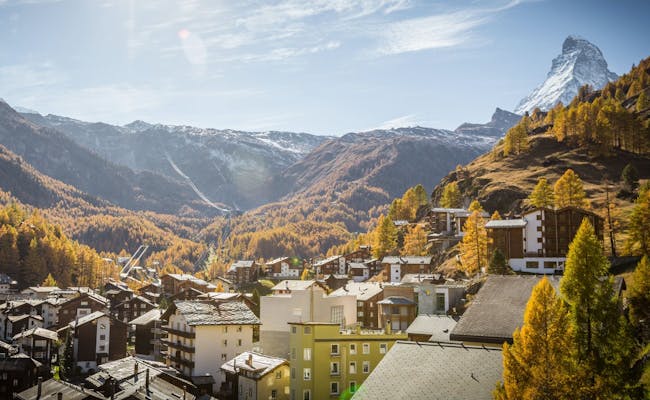 Village (Photo: Zermatt Tourism Pascal Gertschen)
Village (Photo: Zermatt Tourism Pascal Gertschen)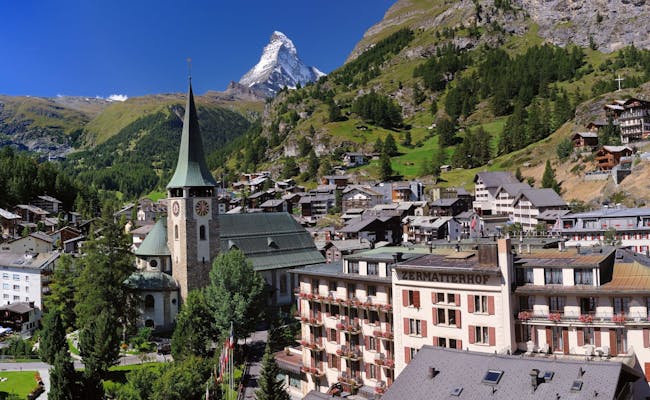 Village (Photo: Zermatt Tourism Leander Wenger)
Village (Photo: Zermatt Tourism Leander Wenger)Zermatt has a very well developed network of mountain railroads. The cable cars are coordinated in their sequence. The individual mountains are also connected to each other by railroads, so that you can quickly get from one mountain to another. Cogwheel railroads, funiculars, gondola lifts and chair lifts provide access to the Zermatt area. Several ski lifts are used in the ski resorts.
In the Matterhorn Glacier Paradise - Schwarzsee area there are 5 gondola lifts, 2 aerial tramways and one 3S lift:
In the winter season 5 ski lifts are operated here.
The trip from Zermatt to the Klein Matterhorn is done with three consecutive cable cars and takes 45 minutes. From Zermatt (1,608 m.a.s.l.) to the Klein Matterhorn (3,883 m.a.s.l.) 2,275 meters of altitude are covered.
Two funiculars, one aerial tramway and one gondola lift operate in the Sunnegga-Rothorn area:
The trip from Zermatt to the Rothorn is made by three consecutive cable cars and takes 20 minutes. From Zermatt (1,608 m.a.s.l.) to the Rothorn (3,103 m.a.s.l.) 1,495 meters of altitude are covered.
The Gornergratbahn, a rack railroad, runs to the Gornergrat. It has these stations:
The Riffelalptram is a narrow-gauge railroad that runs from the Riffelalp station over a length of 675 meters to the Riffelalp Hotel. It operates from mid-June to mid-October.
The journey from Zermatt to Gornergrat takes 33 minutes. From Zermatt (1,608 meters above sea level) to Gornergrat (3,089 meters above sea level), 1,481 meters of altitude are covered.
In addition, there are in the area Gornergrat:
The ski lift Triftji is opened in winter.
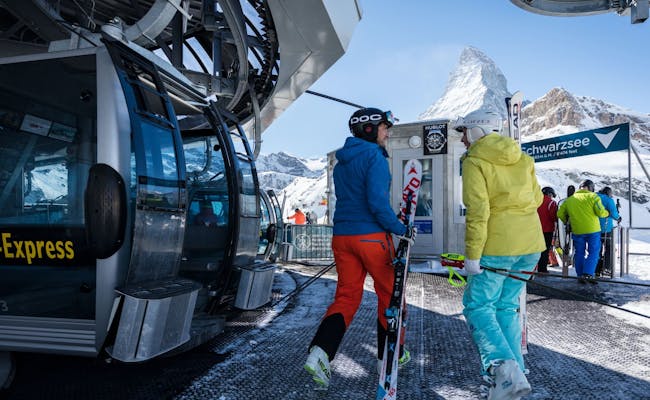 Mountain railway skiing (Photo: Zermatt Tourism Pascal Gertschen )
Mountain railway skiing (Photo: Zermatt Tourism Pascal Gertschen )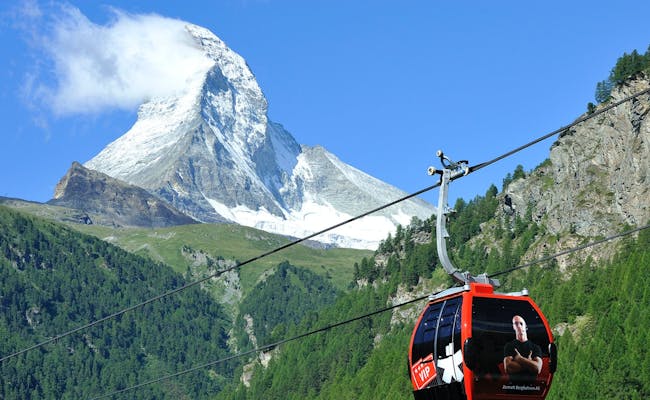 Cable car (Photo: Zermatt Tourism Michael Portmann)
Cable car (Photo: Zermatt Tourism Michael Portmann)Zermatt has a "tundra climate." This climate type is one of the main climatic categories within the subpolar climate zone according to Köppen.
The Zermatt region remains cold throughout the year, with an average annual temperature around zero degrees Celsius. The weather in Zermatt is ideal for a trip to this area all year round.
When hiking in the Zermatt region, it’s important to ascend to higher altitudes gradually. If you plan to go high up, it is best to initially stay at about 2000 meters elevation in accommodation and then continue your ascent from there.
Health risks include the rather rare altitude lung edema and cerebral edema, which occur due to a decrease in oxygen molecules in the air above 3000 meters. When the lungs receive less oxygen, the blood vessels constrict.
More commonly experienced is altitude sickness. It affects around 20% of mountain hikers who reach an elevation of 1,900 m above sea level. At around 6,000 m above sea level, up to 77 percent of hikers may get sick. Symptoms begin with discomfort, headaches, loss of appetite, and sleep disturbances. The severity of altitude sickness is assessed internationally using the Lake Louise Symptom Score (LLSS), with each symptom rated from zero to three points. If the total score goes above three points, acute altitude sickness is confirmed.
To prevent altitude sickness, there is only one approach: gain height slowly and spread higher mountain tours over several days.
